Israeli Strikes On Syria Kill 38, Including 5 Hezbollah Members
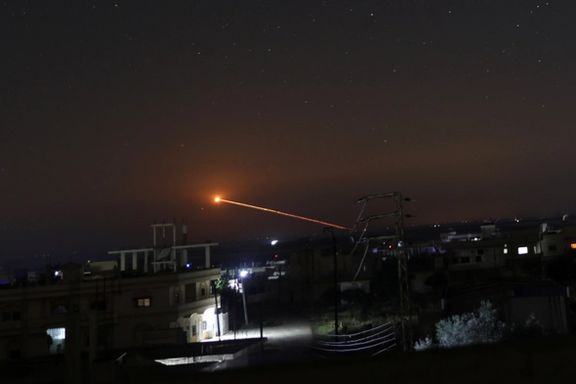
Israeli strikes on the northern Syrian city of Aleppo early on Friday killed 38 people, including five members of Lebanese armed group Hezbollah, two security sources said.

Israeli strikes on the northern Syrian city of Aleppo early on Friday killed 38 people, including five members of Lebanese armed group Hezbollah, two security sources said.
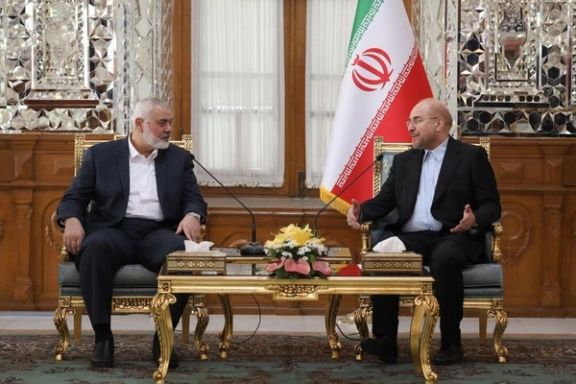
Ismail Haniyeh, the head of the Hamas political bureau, has met with Iran’s Parliament Speaker Mohammad Bagher Ghalibaf during his visit to Tehran, the latest in a string of high level meetings amid the war in Gaza.
"The issue of Palestine is one of the current concerns of the Iranian Supreme Leader. Therefore, we also support you in the parliament and provide the necessary support to the resistance front," Ghalibaf said during the meeting, Ali Khamenei having given birth to Iran's proxy militias around the Middle East.
"In addition, the support of other forces of the resistance front, especially Lebanon and Syria, in the fight against the Zionist regime, was very important," he added, referencing the attacks on Israel launched on other fronts, not only from Gaza by Hamas.
In 2018, US President Donald Trump’s special Middle East envoy Jason Greenblatt, claimed Iran provided $100 million annually to Hamas compared to $700m annually to Hezbollah.
Haniyeh, who arrived in Iran on Tuesday, held talks with key Iranian officials, including Supreme Leader Ali Khamenei, and Foreign Minister Hossein Amirabdollahian.
Ziyad al-Nakhalah, the Secretary-General of the Islamic Jihad Movement in Palestine, also met with Speaker Ghalibaf on Thursday. He also held a meeting with Khamenei on Thursday.
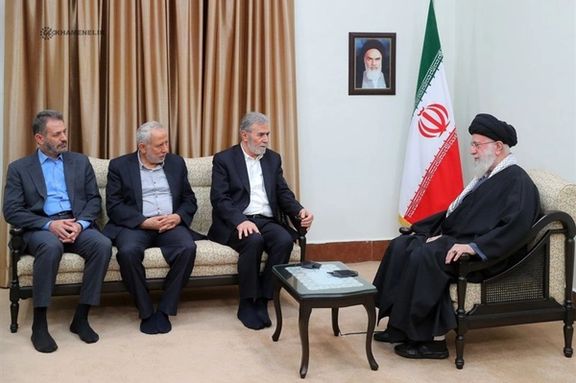
The meetings come against the backdrop of a recent United Nations Security Council resolution calling for an immediate ceasefire in Gaza, where Hamas has been engaged in conflict with Israel following its invasion of the Jewish state on October 7, killing 1,200 mostly civilians and kidnapping more than 250 others.
Haniyeh's visit marks his second trip to Iran since the outbreak of the war, the worst Gaza conflict since Hamas took control of the strip in 2007. Hamas claims around 32,000 people have been killed in Israel's retaliatory attacks in its bid to eradicate the terror group and rescue the remaining hostages.
While Lebanon’s Hezbollah is by far Iran's richest and most powerful proxy, the combined funds of the Palestinian Islamic Jihad Movement, Hamas and the Popular Front for the Liberation of Palestine are enormous, Hamas and Islamic Jihad receiving a large share of Tehran’s aid.
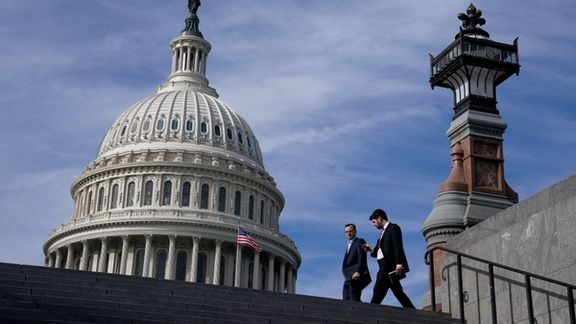
Amid controversy about President Joe Biden's recent stance on the conflict in the Middle East, two Republican lawmakers are calling for unconditional US support for Israel in a bid to battle Tehran’s regional proxies.
Tensions between US President Joe Biden and Israeli PM Benjamin Netanyahu have been deepening as Biden threatens to limit military support for the Jewish state in an attempt to reduce casualties in Gaza amid a humanitarian crisis.
August Pfluger, representative for Texas and a former Air Force F-22 fighter pilot, and Don Davis, representative for North Carolina and an Air Force veteran, wrote in the Washington Examiner that not only is Israel facing an existential struggle against Hamas, whose foundational charter calls for killing Jews and destroying Israel, "our ally is also confronting Iran’s region-wide network of terrorist proxies that attack Israeli civilians, US troops, and commercial shipping vessels".
They said: “In response, we should not only stand beside our partner as Israel defends itself against threats on multiple fronts, but we should also recognize that Israel’s victory against terrorism will be a victory against America’s adversaries and that we therefore must do our utmost to ensure Israel has everything it needs to prevail in this conflict.”
On October 7, Hamas, long backed by Tehran, invaded Israel, killing 1,200 mostly civilians and taking more than 250 hostage in the single most deadly day for Jews since the Holocaust.
Military veterans Pfluger and Davis noted the scores of attacks on US facilities around the Middle East which have followed the outbreak of the Gaza war in Iraq, Syria and more recently, on the Red Sea, punishment for its stance supporting Israel’s right to defend itself in the wake of October 7.
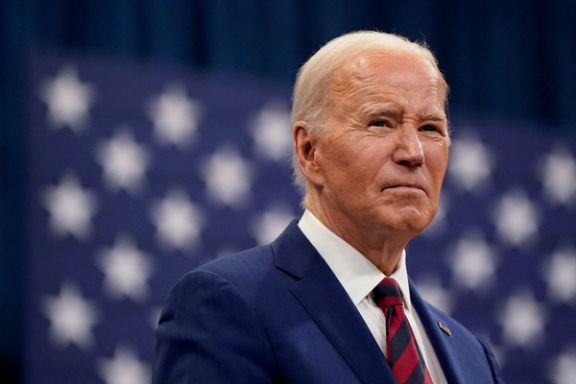
“America must stand beside its partners when they face barbaric attacks, especially when they are fighting enemies, such as Iran’s terrorist network, who are also intent on harming Americans.” Just weeks ago, three US troops were killed by Iranian-backed militia in Jordan as actions against US forces continue to pose deeper risks to troops in the region.
Israel’s response to the Hamas invasion, celebrated by the Iranian regime just hours after the attacks in spite of Tehran’s distancing itself from the operation, has led to what Hamas’s health ministry claims is over 30,000 deaths and aid groups say the strip is on the brink of starvation.
“It is Hamas, not Israel, that bears ultimate responsibility for the suffering and death in Gaza,” the military experts said. “The terrorist group has diverted a vast amount of humanitarian assistance meant for civilians to fuel its own war effort and enrich its leaders instead. It has fired at Palestinian civilians in Gaza fleeing the conflict zone. It hides terrorists and weapons around, in, and under homes, schools, mosques, and hospitals. The use of human shields is not only a war crime but also a cynical ploy.”
It is US support which allows Israel to conduct precise operations, the pair said, using the likes of US-provided precision-guided missiles for its surgical strikes, in addition to the life-saving interceptors for Israel’s Iron Dome missile interceptor system which has protected Israel from most of the 11,000 or more rockets rained down by Hamas, mostly provided by Iran.
“If cuts or conditions on US aid deprived Israel of either of these important munitions, there would only be more, not fewer, civilian casualties — on both sides … Unable to defend against these barrages, Israel would have no choice but to move aggressively and swiftly into all of Gaza to eliminate the launchers.
“Without PGMs, Israel would have to resort to not only using “dumb” bombs but would also have to drop more bombs than it currently does. The result would be far greater devastation of Gaza.”
This week, the US decision not to veto a UN Security Council resolution calling for an immediate ceasefire, has caused deeper rifts between the two countries, as the US election race heats up, the pressure from Democrats to ease support for Israel weighing heavy on the President.
Netanyahu immediately rejected the resolution’s demands, saying that the war aims continue. “Israel will pursue and achieve its just war objectives: Destroying Hamas's military and governmental capacities, release of all the hostages, and ensuring Gaza will not pose a threat to the people of Israel in the future,” he said on Tuesday.
The resolution also failed to address the issue of the more than 130 hostages still in Gaza. “Regrettably, the United States did not veto the new resolution, which calls for a ceasefire that is not contingent on the release of hostages,” the Prime Minister’s office said.
“This constitutes a clear departure from the consistent US position in the Security Council since the beginning of the war … [the] resolution gives Hamas hope that international pressure will force Israel to accept a ceasefire without the release of our hostages, thus harming both the war effort and the effort to release the hostages.”
In Biden’s presidential race, he had called proposals to condition aid “a gigantic mistake” and an “absolutely outrageous” idea. “He was right then, and he would be right now to reject attaching any strings to assistance for our strongest ally in the Middle East,” concluded the military vets.
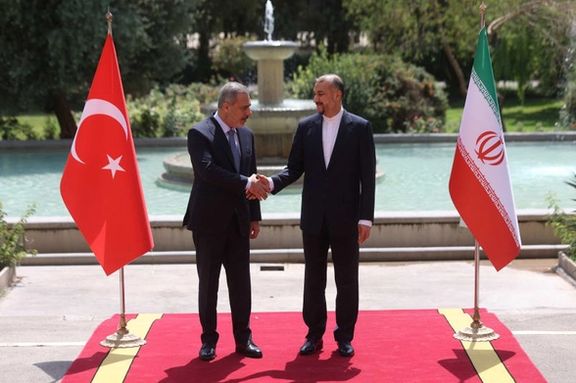
Pro-Iran Popular Mobilization Forces (PMF) of Iraq has given the green light to Baghdad and Ankara to eliminate the Kurdistan Workers Party (PKK) in Iraq.
Turkish Foreign Minister Hakan Fidan confirmed recent talks between Turkey and an official Iraqi institution funded by Baghdad, focusing on Sinjar, where the group has gained ground.
The news reflects Turkey's increasing involvement in Iraq, seeking to forge broader relations to quell longstanding tensions along its southern border, with the recent meeting held between the Turkish and Iraqi foreign ministers in Baghdad on March 13. Security officials, including PMF leader Faleh al-Fayyad and National Security Adviser Qasim al-Araji, were present.
Turkey expressed support for the formation of a 40-kilometer deep buffer zone aimed at eradicating the PKK, deemed a terrorist entity, stretching from Sulaymaniyah to the Syrian border via Sinjar.
Turkish President Recep Tayyip Erdogan is expected to travel to Baghdad in April. He is set to sign an agreement for the establishment of a joint operations command center and a buffer zone, according to Asharq Al-Awsat.
Meanwhile, Iraqi sources told the publication that with the presence of the PMF at the meetings, it signals Tehran's support for the Turks to act in Iraq.
According to the sources, Turkey's military plan calls for a broad operation in mountainous regions in the Kurdistan Region, while Baghdad provides intelligence support, maps and information and monitors the border.
Sulaymaniyah and Sinjar, however, lie on the outskirts of the Turkish buffer zone and intersect with Iranian interests, demanding that Ankara take different political and security arrangements over them.
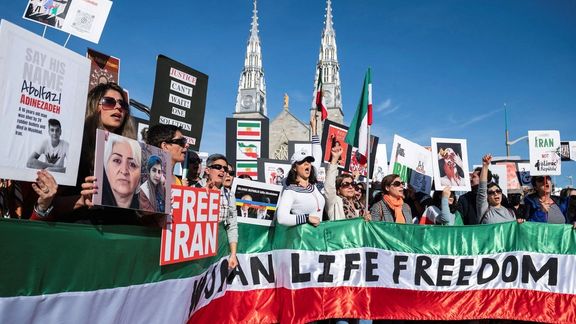
Canada's Foreign Interference Commission is set to decide on adding Iran to its list of foreign governments meddling in the country's internal political affairs.
In September, Canada launched a public inquiry into the interference of foreign governments, particularly Russia, China and India, in the country’s federal electoral processes and democratic institutions.
At its meeting on Wednesday, the commission hosted representatives of the immigrant communities from Iran, Russian, China and India.
Canada-based Iranian dissident Hamed Esmaeilion warned Iran should be included in the list of the countries to be investigated by the commission.
Esmaeilion, who attended the commission’s meeting as the representative of the families of victims who perished in the downing of a Ukrainian airliner by the IRGC in 2020, said, "Although Iran’s name is not yet on the list of the commission, I attended the meeting to discuss Tehran’s attempts to interfere with Canadian affairs."
He told Iran International that there are institutions affiliated with the Iranian regime which operate in Canada, saying, "These institutions are in the minority but try to influence Canada’s macro policies."
Should Iran be added to the list, Canada’s security and intelligence agencies will be obligated to provide the commission with confidential information so that it can decide about Iran’s possible role in Canada’s domestic policies, especially 2019 and 2021 elections.
In November, Microsoft’s Threat Analysis Center (MTAC) warned that Iran, Russia and China are likely to plan to influence the upcoming elections in the US and other countries in 2024.
Last month, Canadian-Iranian lawmaker, Ali Ehsassi, called for an inquiry about Tehran’s potential interference in the country’s elections.
“Given the catalogue of malign and illegal activities committed by the Islamic Republic of Iran on Canadian soil, it would be naïve to believe that the Iranian regime has any compunction to shape public opinion in Canada,” he said in a letter to the Foreign Interference Commission, calling for soliciting testimony and relevant documentation from Iranian-Canadians and others with a substantial interest in the proceedings.
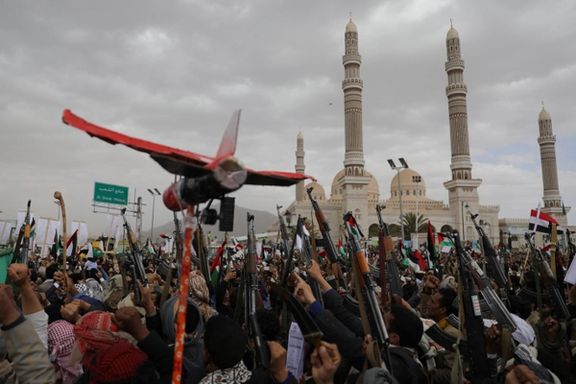
The United States military announced on Wednesday that it had intercepted and destroyed four drones launched by Iran-backed Houthis in Yemen, aimed at a US warship navigating the Red Sea.
According to a statement released by US Central Command on X, formerly Twitter, the engagement occurred at approximately 2am local time in Sanaa (2300 GMT). No injuries or damage to US or coalition ships were reported in the operation.
"These actions are taken to protect freedom of navigation and make international waters safer and more secure for US Navy and merchant vessels," the statement reiterated.
The incident follows a series of aggressive moves by the Houthis, including drone and missile strikes targeting vessels in the Red Sea. These attacks, which began in November, were purportedly conducted in solidarity with Palestinians during Israel's conflict with Hamas militants in the Gaza Strip.
In response to the escalating hostilities, both US and British forces have conducted strikes against the Houthis. The group has since declared American and British interests as legitimate targets, further heightening tensions in the region.
The new drone attacks by the Houthis against the United States come one day after the imposition of new sanctions by the US Department of the Treasury against the Quds Force of the Islamic Revolutionary Guard Corps and two proxy groups affiliated with it, the Yemeni Houthi militants, and Hezbollah in Lebanon, as well as 11 individuals and entities supporting the Syrian President Bashar al-Assad.
The Syrian defense ministry said earlier on Friday that a number of civilians and military personnel were killed after Israel and militant groups launched attacks against Aleppo.
The Israeli airstrikes targeted several areas in Aleppo's countryside at about 1:45 a.m. local time (2245 GMT), the ministry said a statement.
The airstrikes coincided with drone attacks carried out from Idlib and western rural Aleppo that the ministry described as having been conducted by "terrorist organisations" targeting civilians in Aleppo and its surroundings.
However, the ministry did not mention a specific death toll or clarify whether the casualties were caused by the Israeli airstrikes or the attacks by militant groups.
"The aggression resulted in the martyrdom and injury of a number of civilians and military personnel and caused material losses to public and private property," the statement said.
The Israeli military declined comment.
Since the October 7 attack by Hamas on Israeli civilians and soldiers, Israel has escalated its strikes on what it says are bases of Iranian-backed militia in Syria. It has also struck Syrian army air defences and some Syrian forces.
Israel has for years carried out such attacks in Syria, where Tehran's influence has grown since it began supporting President Bashar al-Assad in a civil war that started in 2011.
Fighters allied with Iran, including Hezbollah, now hold sway in vast areas of eastern, southern and northwestern Syria and in several suburbs around the capital.
Israel and Hezbollah have been trading fire across the Israel-Lebanon border since the war erupted in Gaza, the biggest escalation since they fought a month-long conflict in 2006.
(Reporting by Reuters)